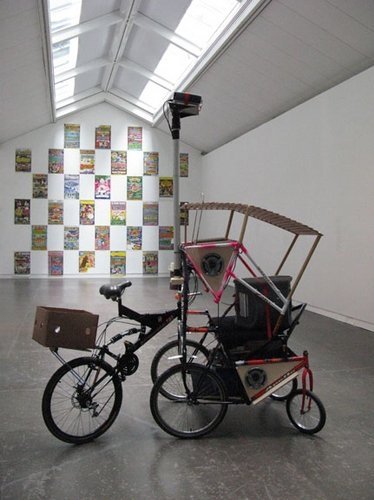The Magnificent Seven
dal 30/8/2009 al 10/12/2009
Segnalato da
Abraham Cruzvillegas
Renata Lucas
Paulina Olowska
Kris Martin
Harrell Fletcher
Ryan Gander
Tino Sehgal
30/8/2009
The Magnificent Seven
CCA Wattis Institute for Contemporary Arts, San Francisco
Capp Street Project: Abraham Cruzvillegas

The Magnificent Seven artist Abraham Cruzvillegas is the Capp Street artist in residence at the Wattis Institute throughout the fall semester. The Mexican artist is best known for his sculptures that transform everyday objects, such as found scrap wood and weathered buoys, into elegant compositions. Updating Duchamp's readymade technique while reflecting the specific locale of where the materials were sourced, his work highlights specific socio-economic circumstances around production. The artist plays the role of a scavenger, finding value in the discarded.
Over the fall semester, Cruzvillegas and the CCA graduate fine art students in his class will collaborate on a project that investigates concepts of need and scarcity in relation to object-making, as well as the politics of improvising with found materials. The starting point for this collaborative project is the organization of a contest amongst the class to customize or transform discarded and found materials into bicycles or other functional vehicles.
An exhibition of these vehicles will be held in the CCA nave from November 15 to 29. All the vehicles will take part in a race on 8th Street in front of CCA on Saturday, November 21 at 2:00pm.
Lead sponsorship for the Capp Street Project artist residency of Abraham Cruzvillegas is provided by the Nimoy Foundation. Special thanks to Monica Manzutto & Jose Kuri for supporting the participation of Abraham Cruzvillegas in The Magnificent Seven program.
September 2009 marks the launch of the CCA Wattis Institute for Contemporary Arts' new program The Magnificent Seven. The seven participating international artists will, over a three-year period, be integrated into every aspect of the institution's structure and activities. Each will present a solo exhibition, complete a Capp Street Project artist residency, produce a publication, teach a number of courses as a CCA faculty member, deliver a public lecture, and participate in other aspects of the Wattis's programming.
The Magnificent Seven is inspired by John Sturges's 1960 film of the same name, a classic Western in which cowboys band together to defend a Mexican village from bandits. (Its plot is based on Akira Kurosawa's 1954 film The Seven Samurai.) All seven artists participating in The Magnificent Seven are individualists, representing an anti-traditional approach to visual art and culture at large. They are outcasts, misfits, revolutionaries, figures outside the established frames of society. By evoking the iconic film genre of the Western—specifically its depictions of militant groups of cowboys fighting on the side of the disenfranchised—this Wattis Institute project speaks about the mythical American struggle between outsiders and society, rugged individuals and the forces of civilization that want to tame them.
With The Magnificent Seven, the Wattis Institute also aims to deepen its relationship with California College of the Arts' academic life, as the artists will be participating in a wide range of programs and teaching in many different disciplines and departments. This unique project represents a different kind of institutional commitment—one that is nurturing, encouraging, supportive, and long-term—enabling each artist to make a profound and meaningful impact within the CCA community.
Scheduled appearances of The Magnificent Seven:
Abraham Cruzvillegas, Fall 2009
Renata Lucas, Spring 2010
Paulina Olowska, Fall 2010
Kris Martin, Spring 2011
Harrell Fletcher, Fall 2011
Ryan Gander, Spring 2012
Tino Sehgal , 2009–2012
Lead sponsorship for the Capp Street Project artist residencies of Abraham Cruzvillegas and Renata Lucas is provided by the Nimoy Foundation. Special thanks to Monica Manzutto & Jose Kuri for supporting the participation of Abraham Cruzvillegas, and to Galeria Luisa Strina, São Paulo, for supporting the participation of Renata Lucas, in The Magnificent Seven program.
Founding support for CCA Wattis Institute for Contemporary Arts programs has been provided by Phyllis C. Wattis and Judy and Bill Timken. Generous support provided by the Phyllis C. Wattis Foundation, Grants for the Arts / San Francisco Hotel Tax Fund, Ann Hatch and Paul Discoe, and the CCA Curator's Forum.
Image: Abraham Cruzvillegas, Autoconstrucción Mobile, 2008. Customized bicycle, steel pipes, wood, cardboard, cables, car battery, speakers, mirrors, car stereo, video projector, DVD player, tea flask, bell, horn. 240 x 125 x 260 cm. Courtesy the artist and kurimanzutto, Mexico City
Press Contacts
Brenda Tucker
Director of Public Relations btucker@cca.edu 415.703.9548
Wattis Institute CCA
Kent and Vicki Logan Galleries
California College of the Arts
1111 Eighth Street San Francisco CA 94107



